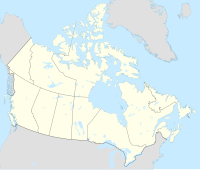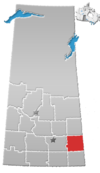Grayson, Saskatchewan
Grayson | |
|---|---|
| Village of Grayson | |
| Coordinates: 50°43′10″N 102°38′43″W / 50.71944°N 102.64528°W | |
| Country | Canada |
| Province | Saskatchewan |
| Region | South-central |
| Census division | 5 |
| Rural Municipality | Grayson |
| Post office Founded | 1906 |
| Government | |
| • Type | Municipal |
| • Governing body | Grayson Village Council |
| • Mayor | Tyson Lowenberg |
| • Administrator | Colleen Stinson |
| • MP | Cathay Wagantall |
| • MLA | Warren Kaeding |
| Area | |
| • Total | 1.87 km2 (0.72 sq mi) |
| Population (2021) | |
| • Total | 185 |
| • Density | 98.9/km2 (256/sq mi) |
| Time zone | UTC-6 (CST) |
| Postal code | S0A 1E0 |
| Area code | 306 |
| Highways | |
| Railways | Abandoned |
| [1][2][3][4] | |
Grayson (2021 population: 185) is a village in the Canadian province of Saskatchewan within the Rural Municipality of Grayson No. 184 and Census Division No. 5.
History[edit]
Grayson incorporated as a village on April 19, 1906.[5] Grayson celebrated its 100th anniversary in 2006.
Demographics[edit]
In the 2021 Census of Population conducted by Statistics Canada, Grayson had a population of 185 living in 98 of its 112 total private dwellings, a change of -12.3% from its 2016 population of 211. With a land area of 1.79 km2 (0.69 sq mi), it had a population density of 103.4/km2 (267.7/sq mi) in 2021.[8]
In the 2016 Census of Population, the Village of Grayson recorded a population of 211 living in 101 of its 117 total private dwellings, a 12.8% change from its 2011 population of 184. With a land area of 1.87 km2 (0.72 sq mi), it had a population density of 112.8/km2 (292.2/sq mi) in 2016.[9]
Economy[edit]
Like many small Saskatchewan communities, Grayson was built along a railway which no longer exists. It no longer has a grain elevator, but a few unique businesses and its proximity to Melville allow it to prosper, particularly the meat plant at Ottenbreit's Meats (source of the famous 'Grayson Sausage').
Grayson also possesses a post office, modern grocery/cafe, hardware store, plumbers, tavern, elementary school, village and Rural Municipality offices, business services and computer technical services. There is also a dance hall, a seniors centre, and apartments for rent. Until 2017, when the Saskatchewan Transportation Company was discontinued, it had a bus drop-off and pickup.
See also[edit]
References[edit]
- ^ National Archives, Archivia Net, Post Offices and Postmasters, archived from the original on 2006-10-06
- ^ Government of Saskatchewan, MRD Home, Municipal Directory System, archived from the original on November 21, 2008
- ^ Canadian Textiles Institute. (2005), CTI Determine your provincial constituency, archived from the original on 2007-09-11
- ^ Commissioner of Canada Elections, Chief Electoral Officer of Canada (2005), Elections Canada On-line, archived from the original on 2007-04-21
- ^ "Urban Municipality Incorporations". Saskatchewan Ministry of Government Relations. Archived from the original on October 15, 2014. Retrieved June 1, 2020.
- ^ "Saskatchewan Census Population" (PDF). Saskatchewan Bureau of Statistics. Archived from the original (PDF) on September 24, 2015. Retrieved May 31, 2020.
- ^ "Saskatchewan Census Population". Saskatchewan Bureau of Statistics. Retrieved May 31, 2020.
- ^ "Population and dwelling counts: Canada, provinces and territories, census divisions and census subdivisions (municipalities), Saskatchewan". Statistics Canada. February 9, 2022. Retrieved April 1, 2022.
- ^ "Population and dwelling counts, for Canada, provinces and territories, and census subdivisions (municipalities), 2016 and 2011 censuses – 100% data (Saskatchewan)". Statistics Canada. February 8, 2017. Retrieved May 30, 2020.



